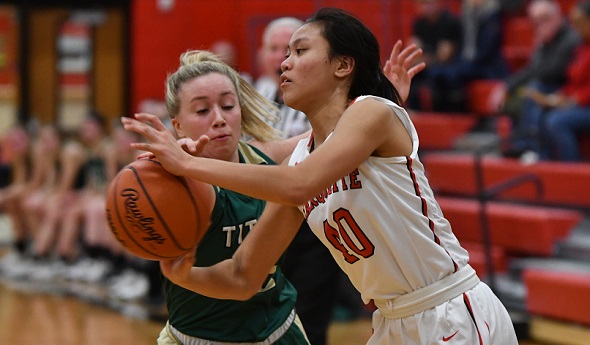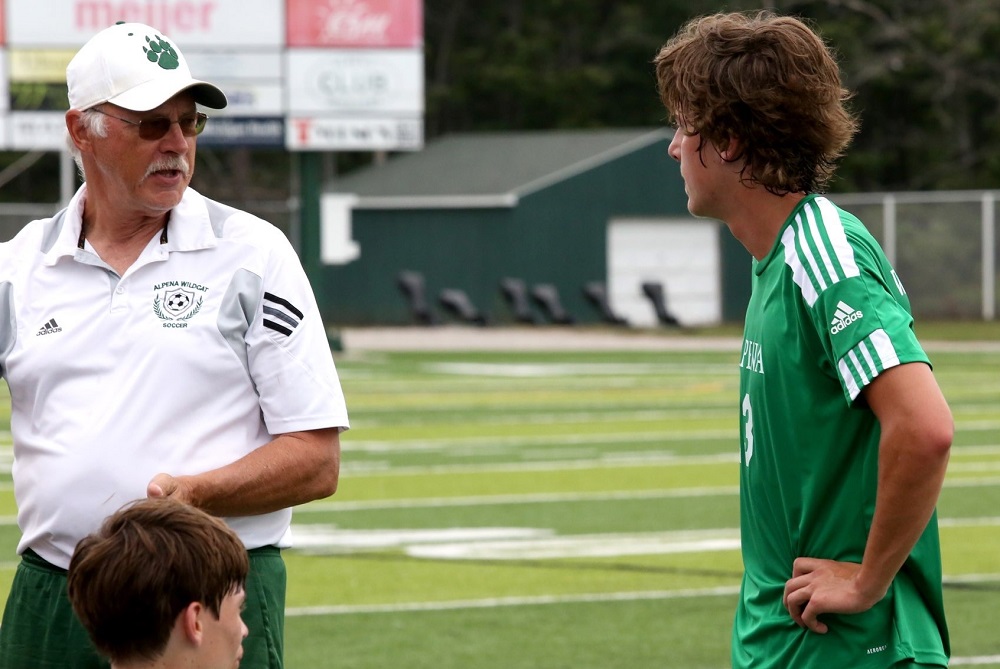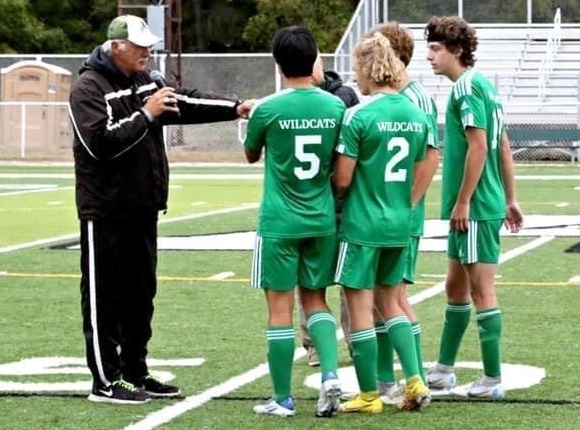
UP Schools Big & Small Find Multi-Sport Success
January 10, 2020
By Dennis Grall
For the Second Half
ESCANABA – It should not come as a surprise that the Class A school with the highest percentage of multi-sport athletes has an athletic director who lived that life.
 Alex Tiseo, athletic director at Marquette High School, received 15 varsity letters while he was a student at the school, including as a three-sport participant for two years in the fall alone. Tiseo played soccer for four years while running cross country for three years and playing football for two. He also played basketball and ran track.
Alex Tiseo, athletic director at Marquette High School, received 15 varsity letters while he was a student at the school, including as a three-sport participant for two years in the fall alone. Tiseo played soccer for four years while running cross country for three years and playing football for two. He also played basketball and ran track.
He is not taking any credit for the excess of multi-sport athletes at his alma mater. "It is the foundation of the thing, the culture of the coaches," Tiseo said of all the school's coaches supporting and encouraging all-around athletic participation.
"It is the benefit and mentality of getting away from (athletic) specialization," Tiseo said, noting an athlete may be "a leader in one sport and just a role player" in another.
He also pointed out athletes are not penalized when they have to miss practices or events because of their heavy extracurricular participation.
According to the most recent multi-sport participation survey conducted by the Michigan High School Athletic Association, Marquette had the highest percentage of multi-sport athletes among all Class A schools in 2018-19 with a whopping 85.9 percent. Grand Rapids Northview, at 83.1 percent, was the only other large school above 80 percent.
Four Class B schools and six Class C schools topped the 80-percent mark while 14 Class D schools surpassed 80 percent, including three topping 90 percent, led by Gaylord St. Mary (93.2).
Marquette, unlike many larger schools, does allow students to participate in more than one sport in the same season. Many small schools, simply because of the lower enrollment, also allow students to compete in more than one sport during the same season.
"It is near and dear to my heart," Tiseo said of seeing multi-sport participation. Students must pick a priority sport if practices or games would conflict on the same date. "For me, it was cross country," Tiseo said, noting his soccer and football coaches knew he was getting plenty of running in that primary sport. In football, he was a place-kicker, which made it easier if he had to miss a practice.
He would often kick with his dad, he said, agreeing that a primary position player may have found it harder to miss a practice or game.
He also pointed out that in fall sports, "one-third of the season comes before school starts" and fall sports ended in mid to late October, reducing the number of potential conflicts.
Tiseo said multi-sport athletes work closely with their coaches to arrange practice schedules: "If coaches have difficulty with the kids in putting the schedule together, there is a caveat there where I can help." To date he has not needed to assist.
Students and coaches alike "reinforce the importance of academics," Tiseo said. "Multi-sport athletes are definitely among our highest academic achievers."
Athletes realize, he said, the importance of staying academically eligible so they can compete in their athletic endeavors.
Tiseo also has noticed student-athletes in general maintain better attitudes, which permeates the hallways and classrooms and benefits the general student body.
Success in athletics can generally bolster improved spirit and attitude in school. He said there is a general attitude of wanting to participate in something "when you see your peers having fun." The long Upper Peninsula winters also help encourage students to participate in athletics to help the time speed along. "It also correlates with the success of the teams," he said.
Two other Upper Peninsula schools have also found outstanding multi-sport participation, with Class B Gladstone at 86.7 percent and Class D Watersmeet with 90.3 percent during 2018-19.
 First-year Gladstone athletic director Dave Lindbeck said "I strongly promote for kids to go to the next level. When I hire a new coach, I ask them how they feel about (multi-sport participation)."
First-year Gladstone athletic director Dave Lindbeck said "I strongly promote for kids to go to the next level. When I hire a new coach, I ask them how they feel about (multi-sport participation)."
Like Tiseo, Lindbeck also encourages athletes to get involved in programs for lifting weights and nutritional growth. Tiseo said proper conditioning and nutrition "help lessen the risk of injury" and playing multiple sports allows students to use different sets of muscles in those various activities. "You don't see over-use injuries" he said.
Lindbeck said "a good strength and conditioning program involves everything, including in-season and off-season workouts and help them maintain strength. We're not asking kids to bulk up. There is a lot of strength and flexibility (training), working (various) muscle groups, strengthen(ing) ligaments."
Lindbeck said the Braves' coaches are encouraged to attend games in the wide selection of activities, which shows students they care.
He also said it is easy to see how students grow in athletics and socially as they raise their participation levels. "You see how they communicate, you see it in the hallways," he said.
He also noted it has a big impact on their classroom work. "Those who don't participate don't do as well," he said, noting B-C students tend to improve their grade-point averages as they increase their involvement. "Kids seldom have issues with their grades.
"It is so crucial to be involved with sports," Lindbeck added. "The ones who do it really value it. We use it as a carrot, a motivator. It also keeps the structure and holds each other accountable."
Watersmeet has only 44 students this school year – up from 36 last year – but the Nimrods definitely are a school and community-oriented program.
Pizza parties, camping trips and cook-outs are among projects to encourage students to participate in sports, and fund-raisers are used to buy warm-ups for players in grades 6-12. "We dress them up so they look special," said long-time administrator-coach George Peterson.
"We work hard to get them to enjoy all the sports."
The board of education uses the Nimrod Fund to help students "dress up and be a part of it," said Peterson, who indicated much of that financial opportunity comes from the memorable 2003-04 season when ESPN coined the "Nimrod Nation" program.
That spring the boys basketball team appeared on The Tonight Show, and the Sundance Channel did a series on the school/town in 2006.
Peterson said the school realized $500,000 in gross revenue as a result of that national exposure and still averages $10-13,000 a year in profits. "I still pinch myself. I still can't believe it happened," Peterson said of that exposure and financial benefit.
Watersmeet has girls volleyball and offers cross country country, basketball, track and golf for boys and girls. "They are proud to be out there," said Peterson. "They have to conduct themselves in a respectful manner.”
The MHSAA study revealed nearly 43 percent of state prep athletes participated in two or more sports in 2018-19. It also indicated "early and intense sport specialization has become one of the most serious issues related to health and safety at all levels of youth sports, with overuse injuries and burnout among athletes tied to chronic injuries and health-related problems later in life."
The survey found 45.1 percent of boys and 40.4 percent of girls participated in more than one sport.
 Denny Grall retired in 2012 after 39 years at the Escanaba Daily Press and four at the Green Bay Press-Gazette, plus 15 months for WLST radio in Escanaba; he served as the Daily Press sports editor from 1970-80 and again from 1984-2012 and currently is in a second stint as the interim in that position. Grall was inducted into the Upper Peninsula Sports Hall of Fame in 2002 and serves as its executive secretary. E-mail him at [email protected] with story ideas for the Upper Peninsula.
Denny Grall retired in 2012 after 39 years at the Escanaba Daily Press and four at the Green Bay Press-Gazette, plus 15 months for WLST radio in Escanaba; he served as the Daily Press sports editor from 1970-80 and again from 1984-2012 and currently is in a second stint as the interim in that position. Grall was inducted into the Upper Peninsula Sports Hall of Fame in 2002 and serves as its executive secretary. E-mail him at [email protected] with story ideas for the Upper Peninsula.
PHOTOS: (Top) Marquette's Maria Millado (40) works to get a pass past a Traverse City West defender last season; Millado also runs track for the Redettes. (Middle) Gladstone's Luke Van Brocklin crosses the finish line to finish second in the 400 meters at last spring's Upper Peninsula Division 1 Track & Field Finals; he played football this fall. (Photos by Cara Kamps.)

Storch Returns to Retirement After Elevating Alpena Teams From Cellar to Contenders
By
Tom Spencer
Special for MHSAA.com
December 16, 2022
It wasn’t long ago that Alpena boys and girls soccer opponents took their long bus rides to play the Wildcats expecting an easy win, and most likely by securing the victory by the eight-goal differential rule, commonly known as the “mercy rule.”
 Worse yet, the Wildcats also had to take those trips across the northern part of the Lower Peninsula, as well as northern and southern journeys of two hours, dreading thoughts of experiencing yet another shortened game.
Worse yet, the Wildcats also had to take those trips across the northern part of the Lower Peninsula, as well as northern and southern journeys of two hours, dreading thoughts of experiencing yet another shortened game.
Those expectations started to change in 2011, when Tim Storch, arguably the most decorated coach in the history of Michigan high school soccer, took the reins of the Wildcats’ boys and girls programs.
Storch made the move after retiring from Troy Athens as a teacher and coach of the Redhawks’ boys and girls soccer teams.
Slowly but surely, Alpena’s mercy losses disappeared – and wins over their Big North Conference opponents became reality. Under Storch, the Wildcats went from the cellar to challenging for titles.
But now, Storch is showing some mercy on the Big North – perhaps an early Christmas present. The conference schools won’t see him on sidelines any longer. He’s retiring – again.
Storch is doing so after leading the Wildcats to wins over all conference opponents except Traverse City West. The Wildcats did get a tie this fall against the Titans, one of the BNC schools that regularly makes a deep postseason run, as Alpena stayed in the league title race most of the season.
“When I came to Alpena it was about trying to make the program relevant in the school, the community, the area, the BNC and northern Michigan,” Storch recalled. “We got to that point after some growing pains.
“Early on we took our lumps, and we were mercied by everybody,” he continued. “By the end we were competitive with everybody.”
Storch, who started the Athens soccer programs from scratch in 1981, won eight Class A or Division 1 Finals titles with the Redhawks. He’s near the top of the lists of the winningest boys and girls soccer coaches in the state. The last of his 1,109 wins was a 3-1 victory over Bay City Western during this fall’s postseason.
The Wildcats also beat conference opponent Cadillac in their District opener. They finished 14-6-3 on the season.
Storch will be dearly missed in Northern Michigan, veteran Petoskey boys and girls coach Zach Jonker pointed out. Jonker’s Northmen picked up a victory over Alpena in the Division 2 District Final – also Storch’s last game.
"Tim has had a legendary career as one of the most influential figures in Michigan high school soccer over the past 40 years while having an enormous impact on thousands of student-athletes,” Jonker said. “Over the past decade, Tim helped to dramatically raise the overall level of play in the Big North.
 “He is one of fiercest competitors I have ever coached against, but he is also one of the most genuine and empathetic coaches I have ever encountered,” Jonker continued. “I feel fortunate to have been able to build a competitive relationship with him and call him a friend."
“He is one of fiercest competitors I have ever coached against, but he is also one of the most genuine and empathetic coaches I have ever encountered,” Jonker continued. “I feel fortunate to have been able to build a competitive relationship with him and call him a friend."
Storch’s last game with the Alpena girls also was a District Final, a 3-0 loss May 31 to West.
Storch is proud of what the Wildcats accomplished, noting logistics — unlike in southeastern Michigan — were a big challenge.
“We were an island,” Storch said. “We were big school in the middle of nowhere.
“We couldn’t get together and have any kind of summer program with other communities because they didn’t have soccer, and if they had soccer they were at a Class D or C level that was way beneath what we were playing in the Big North.”
Storch’s tenure, which included six years serving as the Wildcats’ athletic director while coaching, drew accolades from his coaches and athletic directors. In addition to Jonker, Gaylord AD Christian Wilson, and West boys head coach and girls assistant coach Matt Griesinger gave high praise.
They are among those who will miss the successful coach.
“Tim leaves Alpena in better shape than when he arrived, and that is the true mark of a great coach and administrator,” Wilson said. “He has been an outstanding representative of Alpena High School, both as a soccer coach and as an athletic director.
“Tim brought a level of stability and expertise and was well-thought of by players, coaches, and community members.”
Griesinger, who has led the Titans to considerable postseason success and upheld BNC dominance since taking over the West program eight seasons ago, was particularly impressed with Storch’s energy and passion for his players evident in every match.
“Tim is one of the most respected coaches in the state, and what he has done for the soccer communities in both Troy and Alpena is not just commendable, but also something that every high school coach should hope to emulate,” Griesinger stated. “Storch is a stand-up guy, and all of us other coaches in the BNC should consider ourselves lucky that our journeys in the sport overlapped.”
Storch is leaving Michigan high school sports as they face a shortage of referees and qualified coaches. He’s not certain of the exact reasons for it, but he points to time constraints and pressures faced on and off the field.
And, he knows the days of a teacher starting a career, coaching sports and sticking with it are long gone.
“My wife has always said I was a dinosaur,” Storch said with a chuckle. “Back in my day, even if you had family and kids, you still made time for coaching.
“Coaching was part of my fiber — it kind of defined me.”
Storch is quick to point out “soccer coach” was just one of three hats he wore, along with history teacher and friend.
“I’m Mr. Storch to my students,” he recalls telling his student-athletes at Athens. “I’m Coach to my kids, and I am Tim to my friends.
“They are three different hats; I learned how to wear them and how to balance them.”
Storch looks back to all the friendships he’s made around the game of soccer – with former players, fellow coaches, and referees – with excitement for the future.
He is also keeping in mind former players, referees and coaches who have passed on.
“It is kind of humbling when I think back all the years (to) coaches, referees and players I have interacted with,” he said. “We’re all here for a finite time.
“We need to make the most of it and hopefully leave the place a better place when we leave.”
 Tom Spencer is a longtime MHSAA-registered basketball and soccer official, and former softball and baseball official, and he also has coached in the northern Lower Peninsula area. He previously has written for the Saginaw News, Bay County Sports Page and Midland Daily News. He can be reached at [email protected] with story ideas for Manistee, Wexford, Missaukee, Roscommon, Ogemaw, Iosco, Alcona, Oscoda, Crawford, Kalkaska, Grand Traverse, Benzie, Leelanau, Antrim, Otsego, Montmorency, Alpena, Presque Isle, Cheboygan, Charlevoix and Emmet counties.
Tom Spencer is a longtime MHSAA-registered basketball and soccer official, and former softball and baseball official, and he also has coached in the northern Lower Peninsula area. He previously has written for the Saginaw News, Bay County Sports Page and Midland Daily News. He can be reached at [email protected] with story ideas for Manistee, Wexford, Missaukee, Roscommon, Ogemaw, Iosco, Alcona, Oscoda, Crawford, Kalkaska, Grand Traverse, Benzie, Leelanau, Antrim, Otsego, Montmorency, Alpena, Presque Isle, Cheboygan, Charlevoix and Emmet counties.
PHOTOS (Top) Recently-retired Alpena soccer coach Tim Storch, left, talks things over with one of his players. (Middle) Storch, holding the microphone, elevated the Wildcats’ girls and boys programs since taking over both in 2011. (Photos courtesy of Therese Shaw.)

